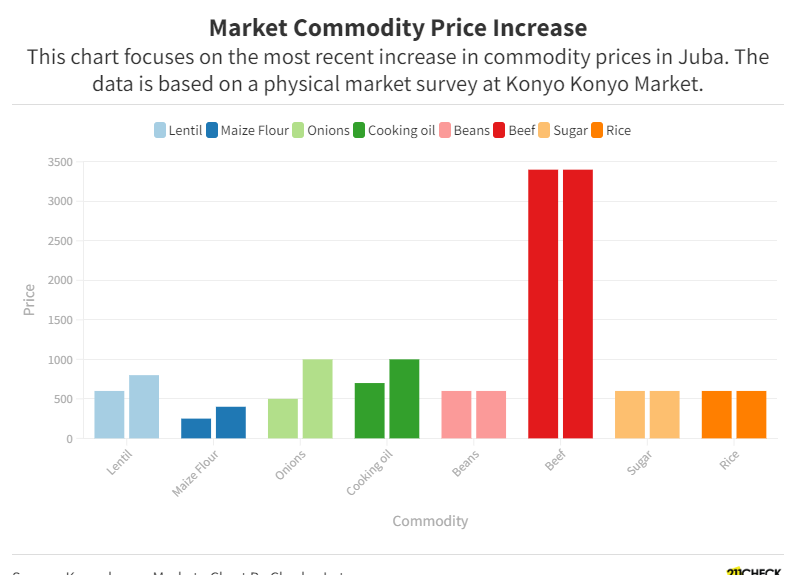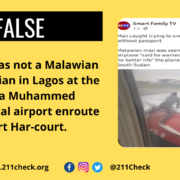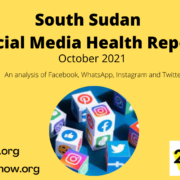Data Story: Commodity Price Hikes in Juba Ahead of Festivities
This story focuses on the most recent increase in commodity prices in Juba. The data is based on a physical market survey at Konyo Konyo Market.
By Charles Lotara
The market prices of commodities in South Sudan have been unstable since the outbreak of civil war in 2013 when the South Sudanese Pounds started losing value against the United States Dollars.
In August this year, the prices of basic commodities almost doubled after truck drivers declared strike over rampant insecurity along the Nimule – Juba Highway, the only major route that connects South Sudan to the rest of East African countries.
This phenomenon compelled the government to enforce security measures to curb the runaway level of criminality and banditry along the highway.
In mid-August, truckers trickled in after security assurance from the government. This has resulted in market stabilization. The government through the Ministry of Finance injected more forex into the market, this resulted in an improved exchange rate. But prices never went down thanks to lack of confidence from traders in sloppy regulatory policies.
And, the skyrocketing prices are worsening as the festive season approaches. A first hand assessment reveals that some have doubled their initial price tags within the space of two weeks. A continuity in trend of increase could make basic commodities unaffordable to low-income households.
On Wednesday, 01 December 2021, the Reconstituted Transitional National Legislative Assembly summoned eight institutions to explain circumstances surrounding market price hikes. These were the Ministry of Trade and Industry, Ministry of Finance and Planning, Ministry of Agriculture and Food Security, and Ministry of Roads and Bridges.
Other institutions summoned by the parliament were the National Revenue Authority, the Central Bank, Chamber of Commerce, and the National Bureau of Standards.
Paul Yoane Bonju, the Chairperson Designate of the Reconstituted Transitional National Assembly blames the government for failure to implement regulations that protect local consumers.
“The prices of commodities in our markets are very, very high these days. Our markets have been dominated by foreigners, and South Sudanese are not in control of their markets,” the Chairperson Designate was quoted by The City Review to have said.
“We are supposed to be a mixed economy rather than a free economy. In a free economy, anybody can come and do anything that he wants, but in a mixed economy, we can control the prices,” added Mr Yoane.
But it is unclear whether the summon of these institutions will drive a positive impact on the market ahead of festivities.
Between late November and the first week of December, a kilogram of lentils was costing SSP 800 up from 600 a few weeks earlier. Our market survey within Juba also reveals that the price of onions has doubled from SSP500 to SSP1000.
By the time of publishing, a liter of cooking was sold at SSP 1000, an increase from SSP 700 two weeks prior. The cost of public transportation also doubled, especially for those staying on the outskirts of Juba. The trend paints a bleak future for the common man.
Leading cause of market price hikes
South Sudan is a landlocked country. The country is one of the biggest importers of commodities. According to the Famine Early Warning Systems Network (FEWS NET), an organization that monitors trends in staple food prices in countries vulnerable to food insecurity, cereal supplies in Juba, Torit, Bor, and Rumbek are mostly sourced from Uganda.
Agriculture production remained poor, especially in states and administrative areas ridden by communal conflict and flooding.
About the Authors:
Charles Lotara, a Data Speaks Fellow at #defyhatenow South Sudan, updated this data story (already in the 211 Check archive), which was edited by 211 Check Editor Emmanuel Bida Thomas and approved for publication by Steve Topua, Data Analyst and Trainer. It’s part of the ongoing #defyhatenow South Sudan Data Speaks Fellowship program with funding from the European Union Delegation to South Sudan.
About South Sudan Data Speaks Fellowship:
This is a two-month and half data journalism fellowship for South Sudanese content creators with an aim of educating participants on the fundamentals of data journalism through in-depth training facilitated by experienced data analysts.
The fellows have been selected from across South Sudan and they are trained in data sourcing/mining, data analysis, and data visualization for two months and half (October to Mid December)
Each fellow will produce a minimum of three (03) data stories during the fellowship. The focus will be on increasing access to information




 211 Check
211 Check  211 Check
211 Check 


 211 Check
211 Check
Leave a Reply
Want to join the discussion?Feel free to contribute!